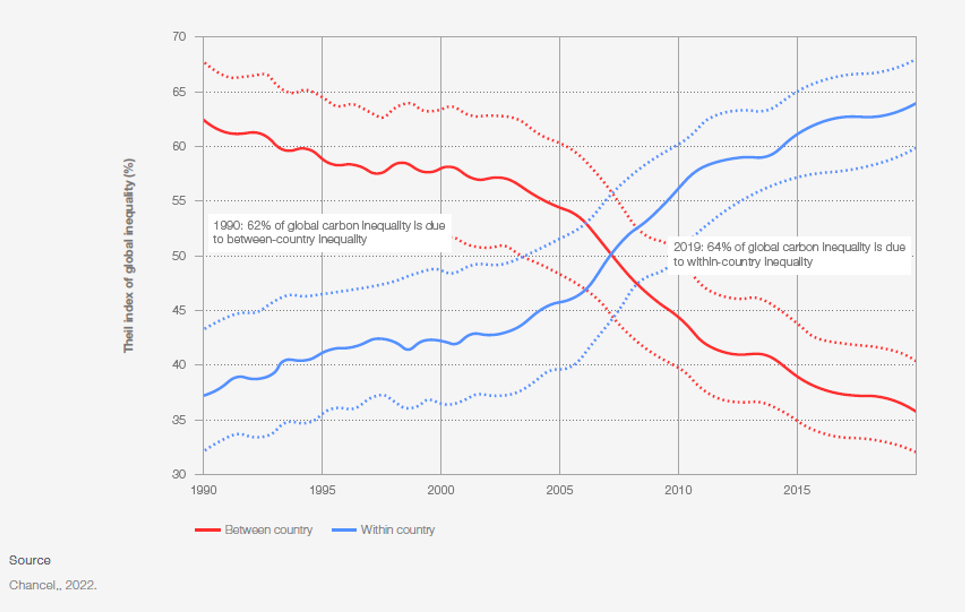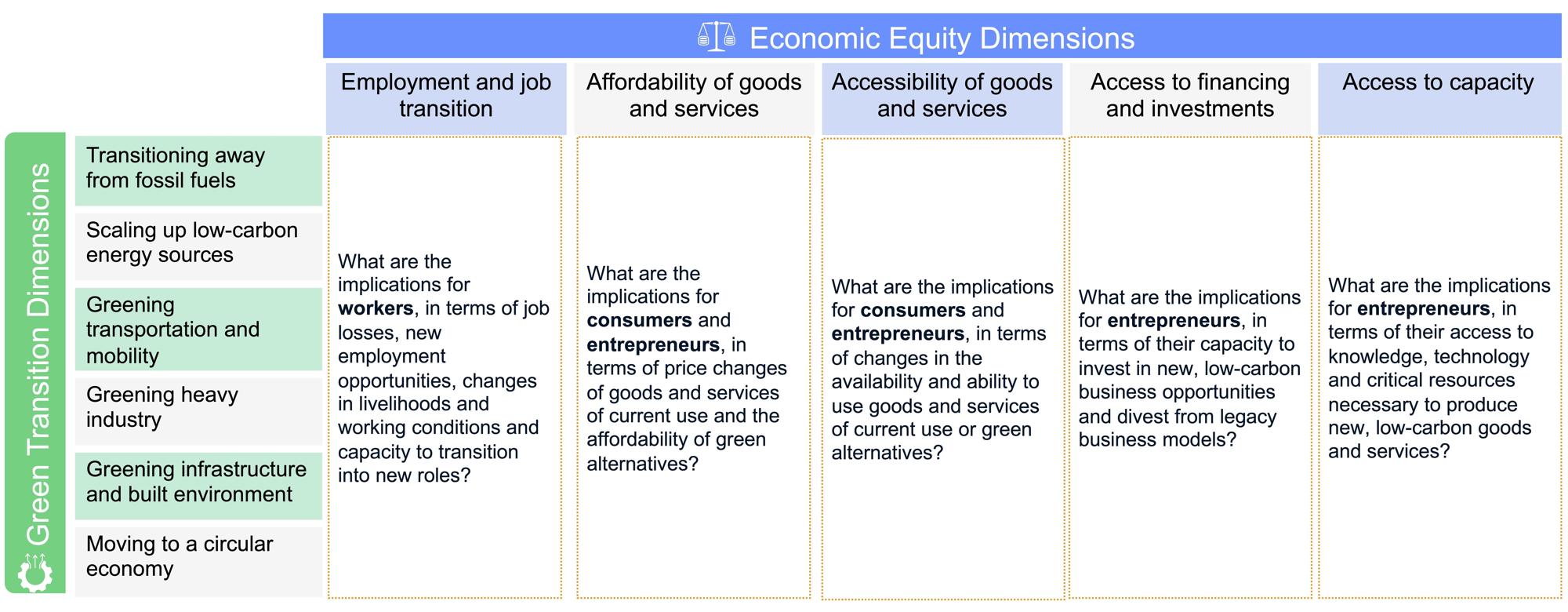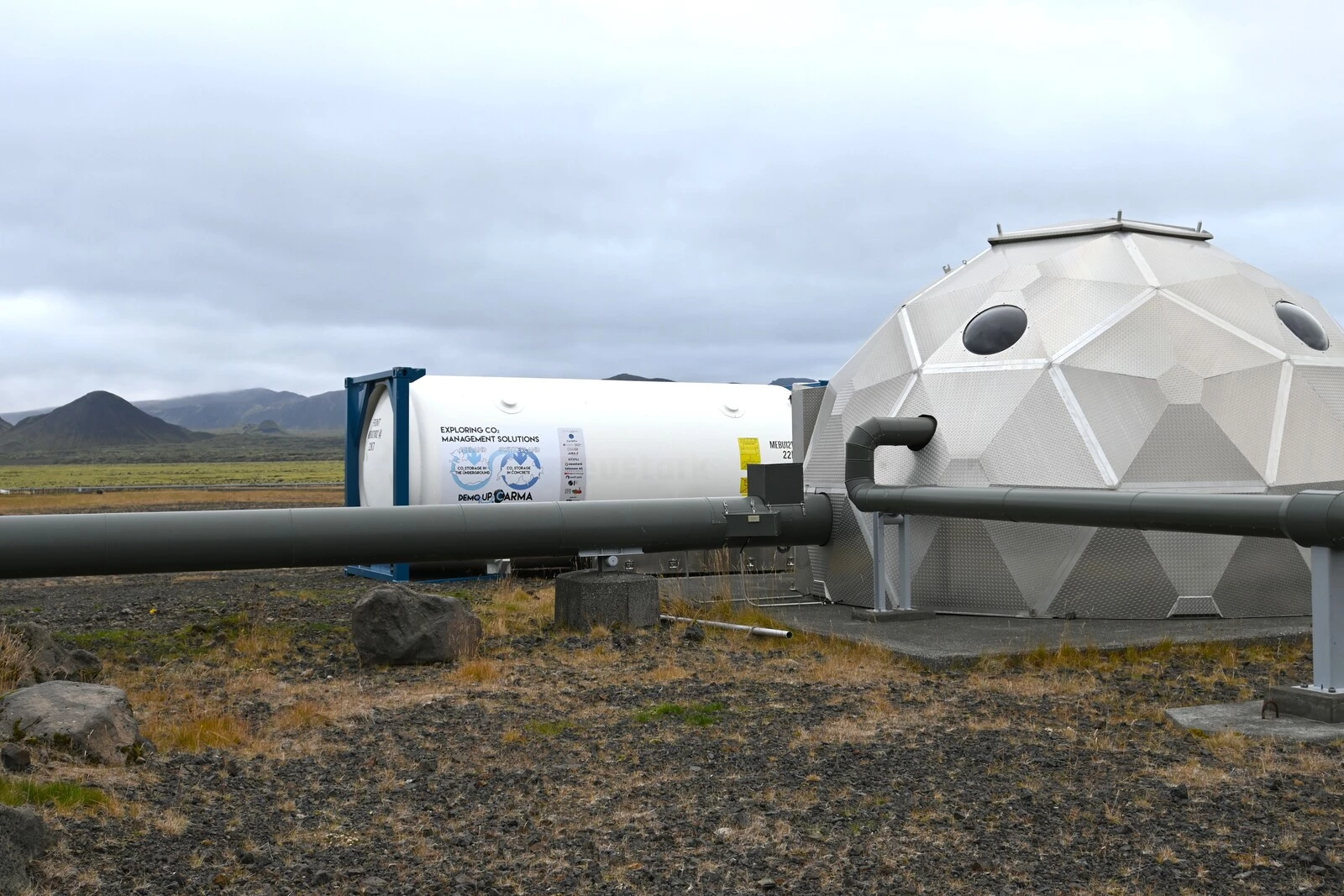Labour market disruptions, risks to the accessibility of products, and gaps in financing and capability impact fairness in the green transition.
- Labour market disruptions, risks to the accessibility of products, and gaps in financing and capability impact fairness in the green transition.
- A shared vision and definition for an equitable transition is essential to identify and address the distributional impacts of climate action.
- Accelerating an Equitable Transition: A framework for Economic Equity supports leaders to enable a fair transition for people and planet.
The window to avert the consequences of climate change is shrinking fast. Despite the unprecedented pace of low-emission technology development, investment allocation and policy implementation over the past decade, the advance of climate change is accelerating. The past nine years, 2015 to 2023, were the warmest on record, and even full implementation of countries’ Nationally Determined Contributions (NDC’s) will put the world on track to warming of 2.5-2.9°Celsius above pre-industrial levels in this century. Climate change-induced environmental risks topped the long-term global risks identified by World Economic Forum’s Global Risks Report 2024.
To keep the goal of net zero by 2050 alive, climate action must be accelerated.
Inequalities, costs and opportunities
The intensification of climate change is occurring in the backdrop of persistent income inequalities. While global inequality between countries has declined since the 1990’s, within-country inequalities have increased. Over the past three decades, income inequality has increased in more than half of the countries globally. The richest 10% of households own around 60-80% of wealth, and the poorest 50% of households own less than 5% of the wealth in all the regions in the world.
Similar disparities parallel the distribution of GHG emissions. Within-country gaps account for 64% of global inequality in per-capita emissions today. The inverse was true in 1990, when between-country divides accounted for 62% of global carbon inequality. In no region of the world do the bottom 50% of emitters contribute more than 5% of GHG emissions. Yet, the exposure to climate hazards and the effects of responses to climate change fall disproportionately on low-income populations.

Global Carbon Inequality
As countries accelerate the green transition, efforts to mitigate climate change will create both costs and opportunities. It is imperative to ensure that distribution of these costs and opportunities do not exacerbate pre-existing inequalities or create barriers to inclusive participation in the transition. The effects of potential shocks induced by climate action, such as energy or food price volatilities, access to basic infrastructure, or affordability of sustainable products can cascade through the economy, falling unevenly on those with limited means to respond.
The social and political support that the green transition requires cannot be developed and sustained unless equity is the foundational principle of the transition. Climate action that exacerbates inequalities can surface geopolitical and socioeconomic fragmentation, which can impact the cost, speed and acceptance of the green transition.
Framework for evaluating equity of the green transition
The green transition requires systemic shifts across several sectors, highlighting the scale of transformation given the state of carbon lock-in. As of 2022, coal, oil and gas accounted for 82% of global primary energy mix. GHG emissions from fossil fuels reached an all-time high in 2023. Breaking the inertia of emissions intensive production-consumption systems indicates the urgency of accelerated scale-up of low-carbon energy sources and transitioning away from fossil fuels. The supply-side interventions need to be orchestrated with simultaneous shifts in technologies, infrastructure and productivity in energy consuming sectors such as buildings, heavy industry and transport.
Beyond energy supply and demand, further emission reduction requires the greening of the food system, including crop production, land use and livestock farming – which are responsible for a quarter of global GHG emissions. Finally, the green transition will require a shift from the linear economic model of “take-make-dispose” to circular economic model of “reduce-reuse-recycle”, to optimize consumption of finite resources and mitigate the ecological impacts of resource extraction, manufacturing and disposal.

A framework for economic equity of the green transition.
The sectors exposed to the green transition are key sources of economic output, livelihoods, and goods and services essential for the society. As the sectoral green transformations take effect, understanding the intersections of the shifts with the drivers of economic inequality is of prime importance. Economic equity considers the fairness in distributing the costs and benefits of the mitigation actions arising from the shift to a low-carbon economy and can be broken down into five areas:
· Employment and job transition: Significant impacts are expected on workers across all industries – the ILO estimates that while 103 million jobs will be created, 78 million workers will lose their jobs and many more will require upskilling.
· Accessibility of products and services: There is a risk that some groups will have limited use of both green and traditional offerings and will therefore be left behind in the transition. EV infrastructure, for example, is less commonly available in rural regions.
· Affordability of products and services: New technologies and processes required to create “greener” alternatives can come with higher costs, leading to high prices for consumers. Equally, the price of existing goods may increase as a result of carbon tax, for example. This will penalise those with low incomes.
· Access to financing and investments: CPI estimates that the average annual need for climate finance in 2030 will be $9 trillion, while current flows are at $1.3 trillion. Unequal distribution of finance flows across industries and business can slow down the transition for some.
· Access to capacity (such as knowledge, technology, patents and resources): In addition to finance, capacity is required to drive the transition and the concentration of know-how can drive inequality.
Charting the course for an Equitable Transition
The scale and nature of the intersections between the green and equity dimensions reflects the complexity and far-reaching ramifications of the green transition. For a transition to a low-carbon and resilient economy that creates shared prosperity and forges an inclusive path for all stakeholders, it is critical to arrive at a shared definition and vision for an equitable green transition.
To this effect, the framework for economic equity in the green transition lays the foundation of the Forum’s “Equitable Transition Initiative”, in collaboration with BCG. The Initiative aims to develop consensus on shared language and organizing principles, as outlined in the publication Accelerating an Equitable Transition: A Framework for Economic Equity. In subsequent phases, the Initiative will distil thought leadership into actionable frameworks and tools, and best practices at sectoral, national and local levels. Furthermore, the Initiative will mobilize a coalition to connect stakeholders from across sectors and geographies for knowledge-exchange and partnerships, recognizing the centrality of public-private collaboration in responding to equity gaps both locally and globally.
As we pursue a more sustainable future, we must strike a delicate balance – harmonizing the critical drive to decarbonize the global economy with the equally vital imperative of addressing human needs. Absent that equilibrium, we risk leaving many behind and dampening the momentum required to keep net zero within reach. But if we put fairness and equity at the heart of climate efforts, we can accelerate progress for people and for the planet.
The report will inform the development of the Equitable Transition Initiative, launching at the Annual Meeting 2024.
By: Attilio Di Battista (Head of Impact Design and Coordination, World Economic Forum) and Douglas Alan Beal (Partner and Director, Global Lead of Social Impact and Just Transition in FI, Boston Consulting Group)
Originally published at: World Economic Forum










